There are two reviews to be written about Master of Dark Shadows, a new documentary nominally about producer/director Dan Curtis. For those of you already immersed in his work, there’s not much in the film you won’t already know.
Worse, much of Curtis’ career is reduced to bullet points between the demise of “Dark Shadows” — the Gothic soap he created in 1966 — and his expensive television collaborations with Herman Wouk in the 1980s, “The Winds of War” and “War and Remembrance.” The cover art might depict Carl Kolchak, the Zuni Fetish Warrior from “Trilogy of Terror” and Bette Davis in “Burnt Offerings,” but “Master of Dark Shadows” breezes past them with barely a mention. Worse, they’re referenced only in regards to Curtis’ interest in escaping the horror ghetto, which is not especially flattering to those works or their fans.
Still, as someone who loves many of the movies and television series touched upon in the film, it felt nice to spend a little time with old friends. Master of Dark Shadows might be a glorified obituary, but it’s an obituary for someone whose work I adore. I’m glad this movie exists, even if the content is a little underwhelming.
 For those of you less familiar with Curtis, think of Master of Dark Shadows not as an obituary, but as a 100-level college course. From a cultural perspective the movies and television shows he created, produced, directed or championed make up some of the fundamentals of American horror. I’d put Dan Curtis in the same category as Rod Serling, Richard Matheson and sure, even Joss Whedon.
For those of you less familiar with Curtis, think of Master of Dark Shadows not as an obituary, but as a 100-level college course. From a cultural perspective the movies and television shows he created, produced, directed or championed make up some of the fundamentals of American horror. I’d put Dan Curtis in the same category as Rod Serling, Richard Matheson and sure, even Joss Whedon.
You always know when you’re watching a Dan Curtis production, credits be damned. They’re deeply American in their sensibilities, which often makes them difficult to parse. He shares Hammer’s interest in formal wear and cleavage, but none of their sense of grace and moral tradition. I’ve compared his first feature, House of Dark Shadows, to Italian Giallo films, but that comparison falls shy of being correct because of the stodgy displays of sexuality in his movies. Curtis also loved classic monsters like vampires, ghosts and witches, but preferred to slam them together against the nihilistic sensibilities of 1970s cinema. There are no happy endings in a Dan Curtis production.
Of course, none of this is really discussed in Master of Dark Shadows. Instead, director David Gregory holds our hand as he walks us briefly through the early days of Curtis’ career as a salesman for syndicated television and his first real success as a producer, bringing golf to television with “Challenge Golf.” Curtis was able to parlay this success into making a pitch for a dramatic series, negotiating with ABC in 1966 for a project that became Dark Shadows. After a slow start, the Gothic soap became a television sensation, and it’s here in the film that Jonathan Frid wrestles away control of the narrative from both Curtis and Gregory. Which is no small feat for a man who has been dead since 2012.
Despite being billed as “The Gothic World of Dan Curtis,” the majority of Master of Dark Shadows is spent discussing Dark Shadows. And whenever you discuss Dark Shadows, you’re going to spend most of your time talking about Frid, the Canadian actor who joined the cast more than 200 episodes into the show’s run and became a pop culture sensation. The gaunt, middle-aged alumnus of Yale and Oxford was set to retire from acting when offered the role of Barnabas Collins…a year later he found himself an unlikely teen heartthrob appearing on the covers “Tiger Beat” and “Sixteen” alongside Davey Jones and David Cassidy.

Image courtesy of collinsporthistoricalsociety.com
More than an hour passes before Master of Dark Shadows moves on from Dark Shadows and Jonathan Frid, spending about 10 minutes on his Herman Wouk adaptations (the first of which, The Winds of War, cost a whopping $38 million to produce — less than some actual wars) before moving back to… Dark Shadows. In this case, it’s the 1991 prime-time “revival” series for NBC, but even in this sequence — the final one in the documentary — you can sense resentment from Curtis over having to return to the well.
Ben Cross, the actor who succeeded Frid in the role of Barnabas Collins, says Curtis wanted to distance himself from the original series to such an extent that he asked the cast not to watch it. Decades later, on another channel and shooting on a different coast, Curtis still found himself in the shadow of Jonathan Frid.
Master of Dark Shadows closes on footage from the 50th anniversary Dark Shadows Festival in 2016 in Tarrytown, New York, and some words from Curtis that Gregory must not have digested. “I’ve always said I’d be remembered for Dark Shadows,” Curtis says in an interview taped sometime before his death in 2006. “And not things I really cared about, which were the great epics that I made. ‘Dark Shadows’ will be the thing that will be on my gravestone.”
When the closing credits begin to roll, it’s over the face of Frid as Barnabas Collins, fangs bared in a panel from the 1971 Dark Shadows newspaper comic strip.

Image courtesy of collinsporthistoricalsociety.com
Frid manages to upstage Curtis in the documentary’s bonus features, too. Among them are a delightful 1968 appearance by Frid on “The Dick Cavett Show” in which the two actors try to out-manner each other. (The episode has been lost, but has been “reconstructed” with stills and audio of the appearance.) There’s amazing newsreel footage of Frid’s 1969 UNICEF Halloween appearance at The White House with Tricia Nixon, plus his “Shakespeare & Poe in the Shadows” PBS special from 1983.
Dark Shadows cast member Kathryn Leigh Scott takes us on a guided tour of the New York City studios used by the show in the 1960s, which is invaluable because the studio has since been demolished. And … well, there’s lots of great bonus features on Master of Dark Shadows. My reaction to the documentary might be lukewarm, but the special features make this disc an essential part of any Dark Shadows fan library.

You can find read more from Wallace on Dark Shadows at
http://www.collinsporthistoricalsociety.com

TV
Did JD from Scrubs Have a Dark Past?

TW: Discussions of child abuse and neglect.
The sitcom Scrubs ran from 2001- 2010 delighting viewers with the escapades of daydreaming Dr ‘JD’ Dorian and his friends. Unlike most TV sitcoms Scrubs perfectly balanced the comedic and the tragic. Being set in a teaching hospital with most of the main cast being doctors; there was plenty of fodder for some truly heart-wrenching storylines.
Like with most sitcoms, if you look under the jolly veneer (and have too much time on your hands) a much darker story emerges. In Scrubs, I would argue, this may be the past of its titular protagonist JD (played by Zach Braff). Some fans (ok, me) speculate that not only did JD have a less than ideal childhood but an abusive one.
Hints of this could be interpretated throughout the series:-
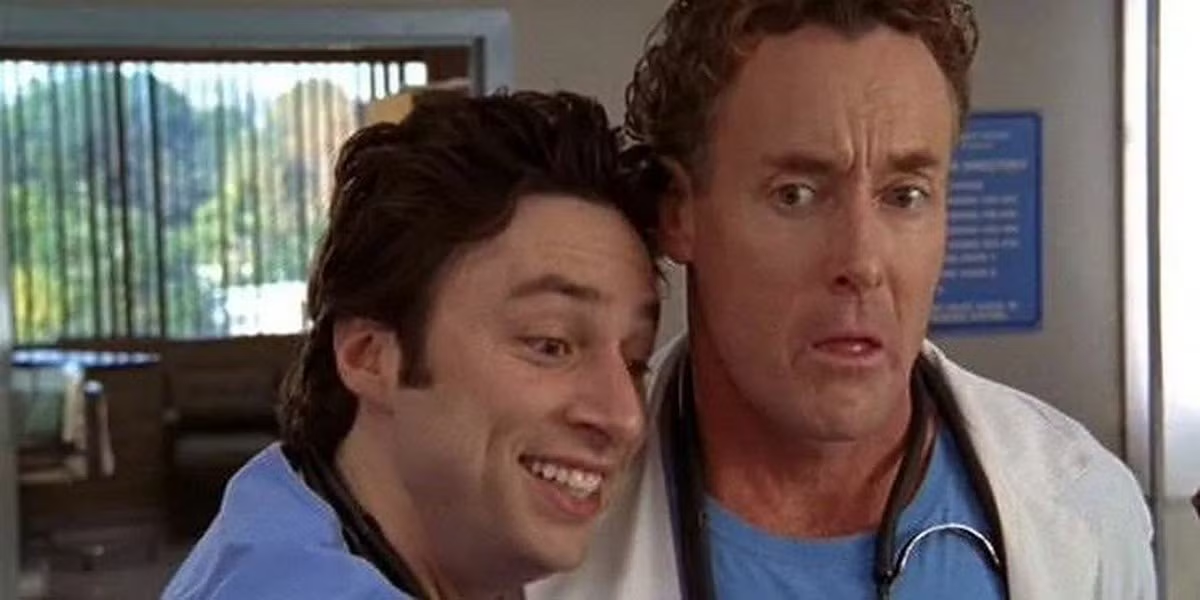
1. Attachment to Dr Cox
One of the most popular aspects of the series is the oddly touching relationship between mentor and mentee: Dr Cox (John C McGinley) and JD. It’s perfectly normal to admire and want to emulate an older colleague. But JD’s admiration of Dr Cox always seemed to go a step further. JD looked to the older doc as not only a mentor but a father figure.
JD explicitly states this throughout the series. Most notably in the finale; when during his much sought after hug JD claims Dr Cox smells “like a father figure”. This is odd as Dr Cox is only about 13 years JD’s senior. We know JD’s biological father (played by the late John Ritter) was pretty much absent during JD’s childhood. Is this yearning for a parental figure a way to fix JD’s damaged childhood?
As loathe as I am to criticise a fan favourite but Dr Cox openly mocks and belittles JD, almost never referring to his protégé by name. Instead by a vast archive of disparaging nicknames. The show does establish that there is love and respect om both sides, from Dr Cox deep down (deep, deep down). But why does JD not only put up with as well as seek out this treatment? Very masochistic. Or, has JD been subconsciously taught that taunts and aggression equate to love?

2. Feels Affinity with Dr Cox and Elliot
The show establishes early on that Dr Cox had an abusive homelife as a child. He openly reminisces about his parents being violent alcoholics. Is this the real reason that JD clamours for Dr Cox’s attention? Does JD see Dr Cox as an inspiration of someone who came from a similar background to his and became a well-respected doctor and family man?
Is the same true of JD’s on/off girlfriend, future wife and fellow doctor; Elliot? The show establishes that Elliot’s parents are mentally, emotionally, and financially abusive. Are JD and Elliot drawn to one another (partly) because they are both traumatised by their past? Even when it is proven time and time again that they are not suited.

3. Hostile Relationship with Older Brother
JD’s older brother Dan (Tom Cavanagh) appears several times in the show. Despite regularly visiting his kid brother, JD makes clear that these visits are not welcomed. JD’s ire is uncharacteristic as he’s shown as an ardent people pleaser throughout the show. Yes, Dan did bully JD throughout their childhood, though it’s unclear whether this was normal sibling rivalry or more.
In Series 3 Episode 5 ‘My Brother, Where Art Thou?’ JD attempts to cut off contact with Dan claiming that Dan never looked out for him. Even as children of divorce why is JD so upset his brother didn’t protect or “come through” for him? In the same scene JD comments about how their mother “married anyone that rang the doorbell”. Reading into this (hey, it’s what we’re here for) did Dan not protect JD from these multiple husbands?

4. Audience Never Actually See JD’s Mother
To me this is the most obvious that something is suspicious about the Dorian matriarch. Despite seeing every other cast members mother (except Dr Cox but its implied that his parents are dead) we never see JD’s. He, at the very least, seems to have a good relationship with his mother. Mostly speaks highly of her and she calls often. It doesn’t follow the trope many sitcoms use; having a character the audience never physically sees being used for comedic effect.
We hear JD’s mum (Barbara) speak in a flashback (Series 3 Episode 21 ‘My Self-Examination’). While Barbara was tucking young JD into bed she was saying some quite toxic things to her child, like how no women will ever be good enough for him. It is clear this scene is supposed to be somewhat creepy as Barbara is stroking the child’s face in an inappropriate manner. Adult JD even refers to his mum as “sexy” in the same episode. Very Freudian but in the light of everything else we are discussing: very disturbing!
5. JD’s Mother Drank
Linked to number 4 JD admits in Series 8 Episode 2 ‘My Last Words’ JD admits his mum “drank a lot”. Does this statement answer some questions about JD’s odd childhood?
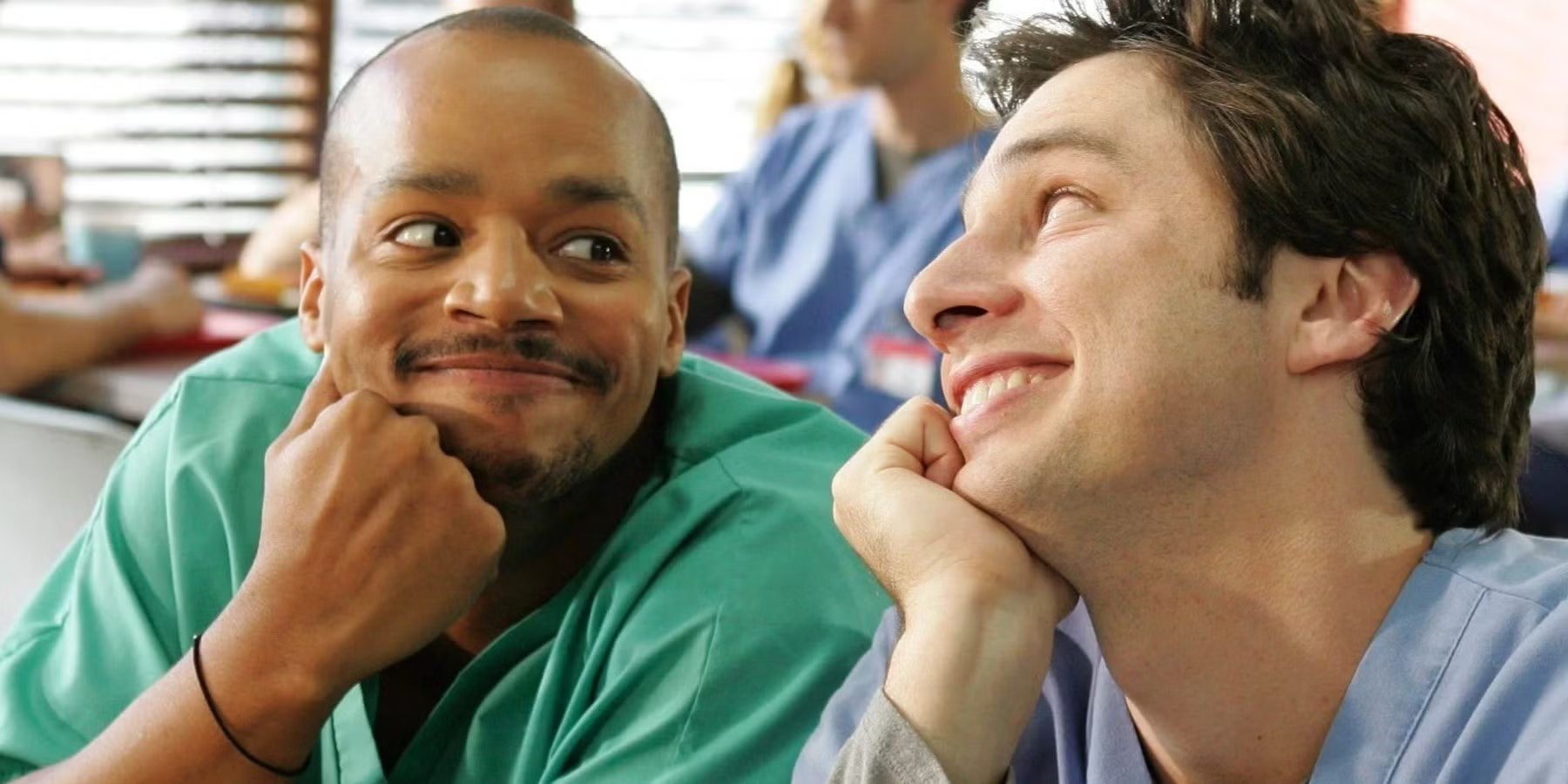
6. JD is a People Pleaser
As we have already mentioned JD is a pathological people pleaser (what’s that like?). As a doctor he goes above and beyond for his patients. He does everything from finding patients estranged family members (Series 4 Episode 11 ‘My Unicorn’) to shaving his head in solidarity with a chemo patient (Series 5 Episode 15 ‘My Extra Mile’). Of course this is all very commendable but JD particularly enjoys the gratitude. Why does he need this validation? Is this a coping mechanism from a turbulent background who had to go above and beyond to get the love that should have been unconditional?
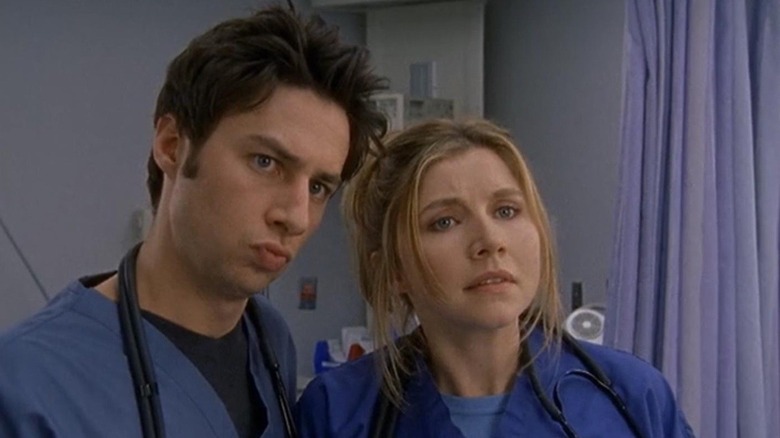
7. Extremely Tactile
Another of JD’s character traits is he extremely tactile. This is of course played up for comedy with his ‘sneak hugs’ (Series 6 Episode 13 ‘My Scrubs’) delivered to the stand-offish Dr Cox or the fact he has his friends on a ‘hugging schedule’ (Series 5 Episode 8 ‘My Big Bird’). Is this someone trying to seek the love and affection he never received in childhood? Or reassure himself that the people he loves won’t disappear?
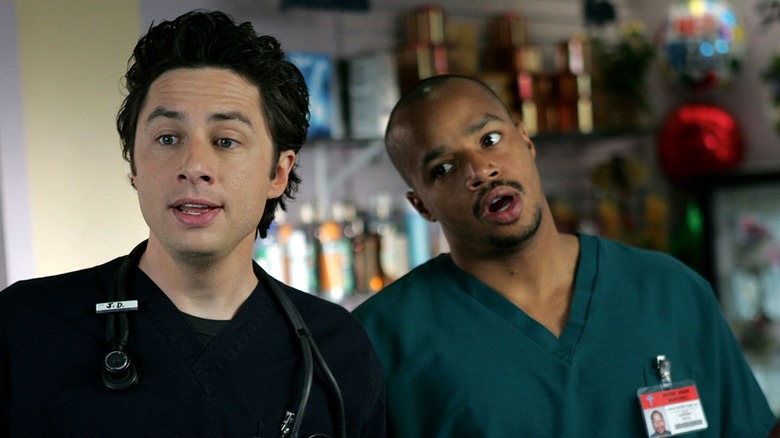
8. Self-Sabotaging
A common reaction to childhood trauma is self-sabotaging behaviour. In his romantic relationships JD has this in spades. Throughout the run of the show JD has more romantic partners than the rest of cast put together. It is acknowledged that JD goes from relationship to relationship with alarming speed and breaks them off for shallow reasons. Again, he may be trying to seek the love and security he never had in childhood.
JD’s damaged psyche is put on full display when after spending the majority of the series chasing Elliot she finally leaves her loving boyfriend for him. JD immediately decides he doesn’t want her anymore to many fans outrage (Series 3 Episode 20 ‘My Fault’).
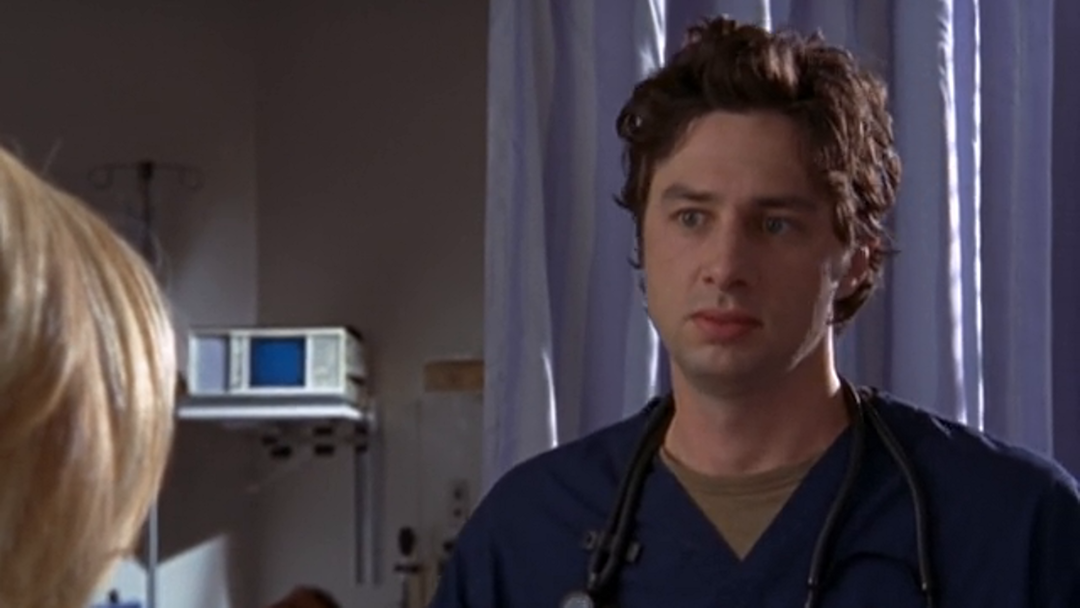
9. No Therapy
As well as never actually seeing his mother, we never see JD engaged in any kind of therapy. All of the other characters attend various types of therapy throughout the series. JD does not, despite arguably needing it the most. Is JD perhaps too scared of what therapy might uncover or not want to deal with his trauma head on?
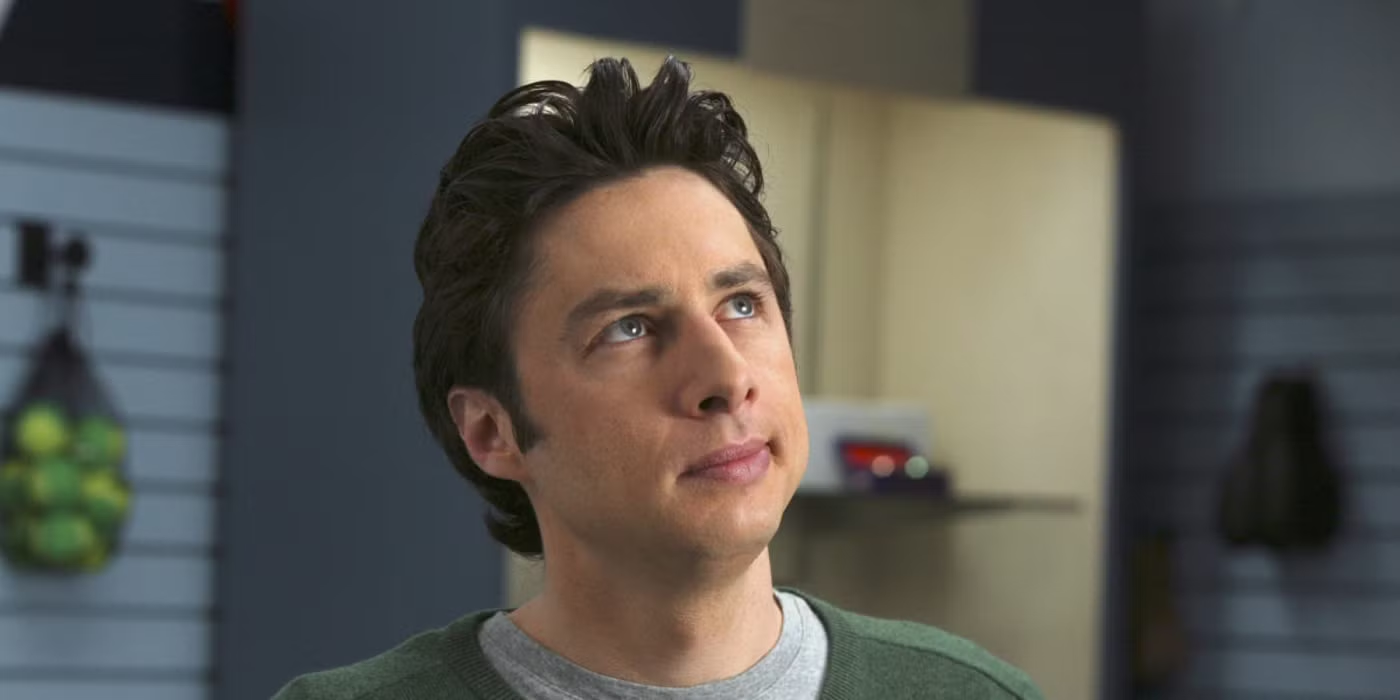
10. Overactive Imagination
During Scrubs entire run (except the final series thou shalt not be named) hinges on JD’s overactive imagination. His outlandish fantasies make for excellent comedy and unique sequiturs to break up the storylines. But what if this was yet another coping mechanism for the hapless leading man?
Children from challenging background often disappear into elaborate fantasy worlds in order to escape their surroundings. Is this a habit JD could never quite kick? It would explain why he doesn’t seem to have a lot of control of his daydreaming despite being an adult. It is a comfort and a way to deal with the difficult stuff life throws at him.
If any or all of these speculations are true Scrubs goes from being a mere half-hour sitcom to a story of one man’s triumph over his dark past. Despite his flaws and failings JD has still made something of himself and is surrounded by his chosen family; all of whom love him for who he is. This is extremely inspiring.
Movie
‘Mufasa: The Lion King’ Will Leave You Breathless

“Mufasa: The Lion King” is a visually stunning addition to the beloved Lion King franchise, offering a fresh and emotionally resonant take on the origins of one of Disney’s most iconic characters. The film beautifully explores Mufasa’s journey, balancing heartfelt moments with touches of comedy that lighten the mood and make the story accessible to audiences of all ages. The animation is breathtaking, capturing the vibrant landscapes and lush environments of the Pride Lands, adding depth to Mufasa’s character and his relationships.
The storytelling is compelling, effectively pulling at the heartstrings while providing insights into Mufasa’s character before he becomes the legendary king. However, the setup for Scar’s betrayal feels somewhat underdeveloped, lacking the deeper motivation that could have enriched their complex brotherly relationship. This missed opportunity leaves a slight gap in understanding Scar’s actions, which could have elevated the dramatic stakes.
The musical score is impressive, featuring memorable songs that enhance the emotional impact of pivotal scenes. While there are several standout tracks, one song, in particular, resonates deeply and is sure to linger in viewers’ minds long after the credits roll. Overall, “Mufasa: The Lion King” is an amazing film and a worthy addition to the Lion King lore that manages to deliver both laughter and tears, offering a rich tapestry of storytelling that fans will appreciate.
Movie
Is ‘Kraven the Hunter’ a Total Letdown?

“Kraven the Hunter,” directed by J.C. Chandor, aims to introduce a beloved Spider-Man villain to the big screen, but unfortunately, it falls short of expectations. The film suffers from noticeable issues, notably an overuse of ADR (Automated Dialogue Replacement), which detracts from the authenticity of the characters’ interactions and contributes to an uneven audio experience. This technical flaw is compounded by rough storytelling that feels disjointed and lacking in coherence, leaving viewers struggling to connect with the narrative.
Aaron Taylor-Johnson delivers a commendable performance as Kraven, showcasing the character’s gritty nature and complex motivations. His portrayal has potential, and it’s evident that he could elevate the character far beyond what is presented with a stronger script and direction. However, the absence of Spider-Man, a central figure in Kraven’s lore, leaves a void that the film struggles to fill. Without this critical connection, the plot meanders and fails to create the tension or stakes that fans of the superhero genre crave.
Additionally, including Rhino as a villain feels like a missed opportunity; he is presented more as a gag character with limited screen time, undermining any sense of threat or depth. For the average moviegoer, “Kraven the Hunter” might entertain but ultimately feels like a mediocre viewing experience. Comic book fans, however, may find disappointment in this lackluster attempt to create a solo character film. Instead of an exhilarating dive into Kraven’s world, the film presents a watered-down version, leaving audiences wishing for a more cohesive vision that honors its comic book roots.


